Inclusive voices, networking opportunities: Over 150 attend 1st-time ICLCLE literacy conference at Purdue
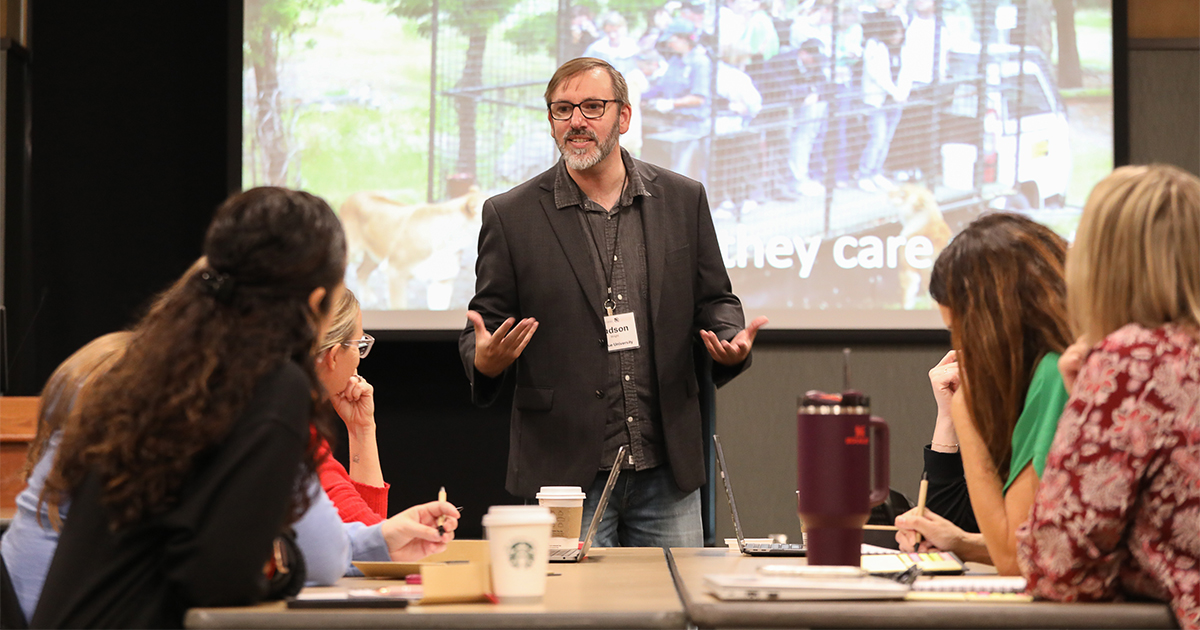
Judson Wright of Purdue University presents a workshop on fostering inclusive multicultural and multilingual classrooms (All photos/Purdue University)
The Fourth International Conference on Literacy, Culture, and Language Education (ICLCLE) took place from Oct. 25 – 27, 2024, at Purdue University.
Its theme was “Literacy and Language Without Limits: Innovative Practices for Inclusive Education.”
Over 150 educators attended the conference which was organized by the Purdue College of Education’s Center for Literacy and Language Education and Research (CL2EAR). Attendees came from across Indiana (including Fort Wayne, Bloomington, Lafayette, Indianapolis, Muncie, Noblesville, and Valparaiso); the U.S.; and Bangladesh, Canada, South Africa, Cambodia, Vietnam, India, Ghana, Nigeria, China, Korea, and Myanmar. Presentations were submitted by researchers and practitioners from 16 U.S. states and 14 countries.
The conference also included sponsors Brookes Publishing, INTESOL, Taylor University, and the College of Education.
The International Conference on Literacy, Culture, and Language Education (ICLCLE) is a multi-, inter-, and trans-disciplinary event that brings together language and literacy focused researchers, educators, scholars, instructors, practitioners, activists, and graduate students from around the world. Founded at Indiana University in 2018, ICLCLE fosters opportunities for sharing and discussion of research, pedagogy, and practice about diverse issues in language, literacy, and culture in education.
The conference moved to Purdue University in 2024, where it will continue to support local and global dialogue by providing space for the exchange of ideas and experiences, research-to-practice connection, and collaboration among practitioners and scholars.
“Bringing ICLCLE to Purdue presented a wonderful opportunity to build on an already fantastic event!” said Jennifer Renn, conference coordinator and research assistant professor.
“The ICLCLE conference brought together academics, teachers, and students from all over the globe to discuss the intersections between language and literacy – two constructs that are often constructed as the exact same, leading to the same instructional practices,” said Trish Morita-Mullaney, center associate director of CL2EAR and associate professor of language, literacy, and education. “Given CL2EAR’s focus on the relationships between literacy and language and their distinctions, the ICLCLE conference brought together all the right people to discuss, informing important decisions for teaching and learning.”
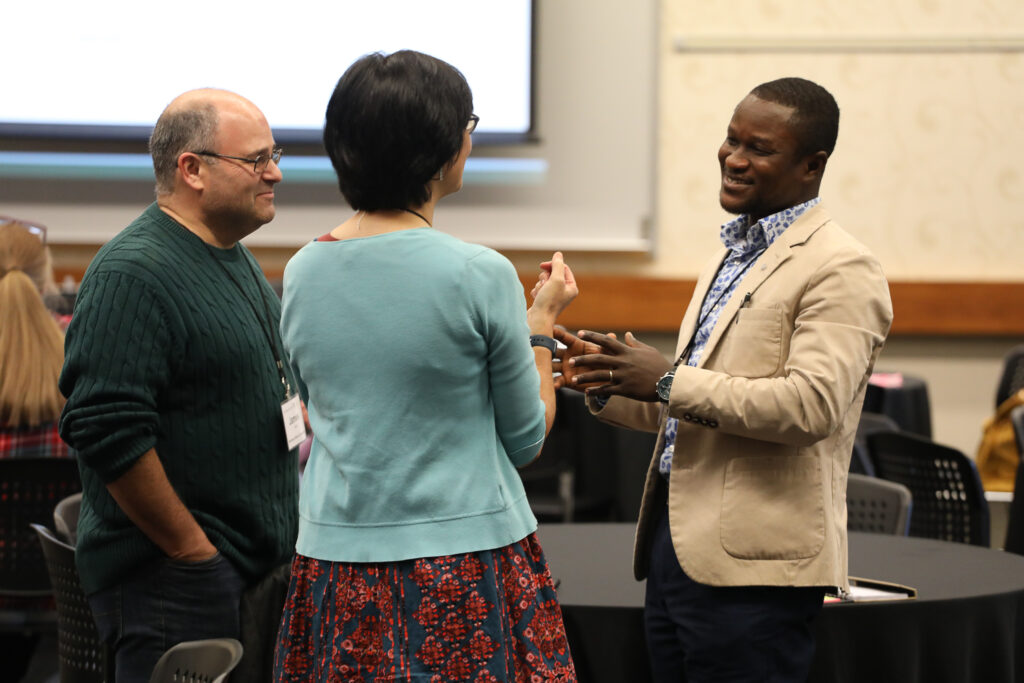
and Purdue College of Education alumnus Razak Dwomoh (r)
More than 20 graduates and current participants in National Professional Development studies led by Morita-Mullaney attended the conference as well as a pre-conference luncheon. Four of these teachers spoke on a panel entitled “The Long-term Impact of Explicit Teacher Training: From Educator to Advocator/Agitator,” where they spoke with master instructional coach Dr. Serena Tyra about their transformations in thinking and practice after completing Purdue’s online English Language Learning Licensure and Dual Language Bilingual Education certificate programs.
The conference opened on Oct. 25 with a welcome followed by the first keynote speaker, Dr. Serafín M. Coronel-Molina of Indiana University – Bloomington, whose presentation highlighted ICLCLE’s international roots. In “The Sociolinguistics of Andean and Amazonian Languages in South America,” he explored issues surrounding language shift and maintenance, language policy and planning, and bilingual education in the Andean region, as well as ongoing efforts in language revitalization.
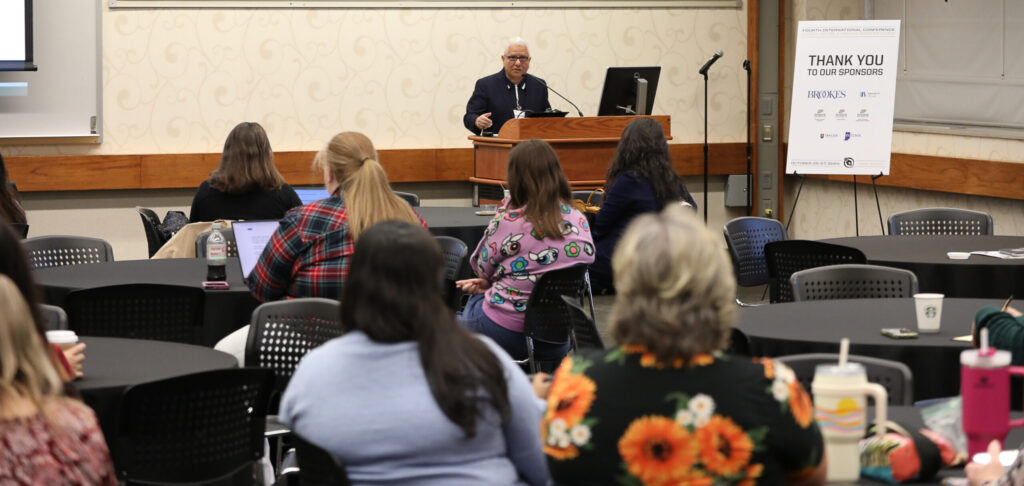
Friday’s 14 concurrent sessions included paper presentations on dual language bilingual education, language education in Cambodia, and information literacy. There were also two interactive workshops, one on fostering inclusive classroom environments and one on decolonizing language hierarchies in post-apartheid South Africa, which included drums and other instruments played by the presenter and attendees.
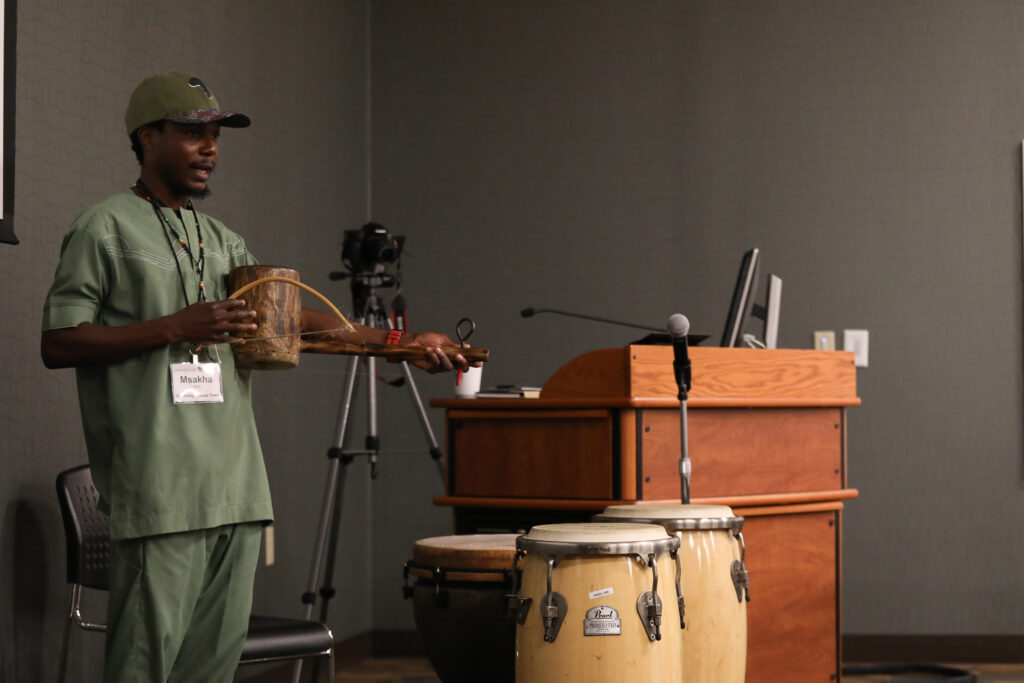
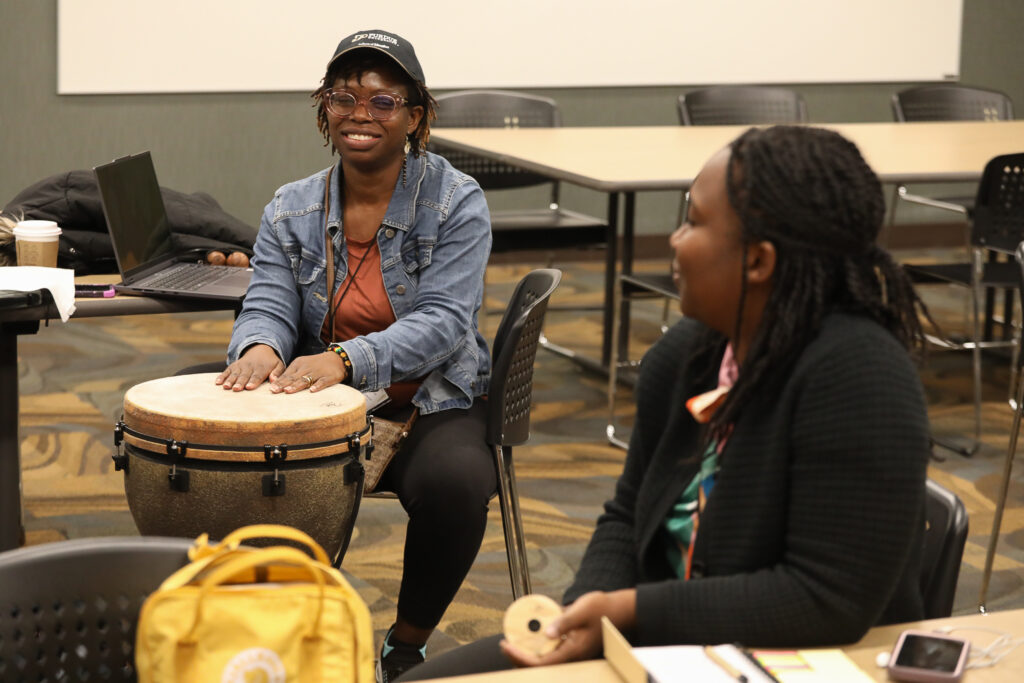
(l) Msakha Mona (University of Cape Town) and attendees (r) played various instruments during his interactive workshop, “Decolonizing Language Hierarchies in a Post-Apartheid South African University: The Role of Translanguaging.”
That evening, the College of Education Engagement Board‘s Dr. Mark Eutsler and Erin Perdue joined over 75 conference attendees at a networking mixer at the John Purdue Room in Marriott Hall, with snacks generously provided by the Engagement Board.
On Oct. 26, there were 40 concurrent sessions including panels on teacher transformation through training and the Science of Reading; roundtables by topic (guided, informal discussions about topics including the Science of Reading, interdisciplinary instruction, early literacy, and multilingual learners); and six interactive workshops, seven research-to-practice presentations, and 22 paper presentations on a variety of topics related to literacy, culture, and language education.
That afternoon, Dr. Kathy Escamilla of the University of Colorado – Boulder gave the second keynote. Her presentation, “Creating Comprehensive Literacy Programs for Multilingual Learners: Foundational Skills and Beyond,” perfectly fit the focus of connecting research to practice. She touched on high interest topics like the Science of Reading and working with emergent bilinguals, and discussed the implications of current policy initiatives, including many state initiatives that have omitted literacy components in their mandates that research has determined are most critical for emergent bilingual learners.
Conference attendees danced that evening to the music of local band Clave Caribe featuring College of Education doctoral student Jorge Daniel Perez de Jesus on vocals at the social event at the Knickerbocker Saloon in Lafayette.
On Oct. 27, there were 17 concurrent sessions in the morning. Paper topics included family language policy; and early literacy, numeracy, and translanguaging in Chinese and Korean contexts. There were also research-to-practice presentations on critical media literacy and identity, an interactive workshop on writing algorithms, a panel on publishing in education, and a networking session called “Breakfast with the Experts” where attendees had the opportunity to chat informally with a range of experts, including the two keynote speakers.
“Purdue University is an ideal home for ICLCLE given the outstanding research and the international reputations of our College and Education faculty and graduate students in the areas of language, literacy, and culture,” said Wayne E. Wright, associate dean for research, graduate programs and faculty development.
“When the steering committee discussed our vision for the conference, we realized how critical it was to include the voices of in-service educators and to provide a range of opportunities for networking and relationship-building,” Renn said. “This fostered a dialogue between researchers, who are knowledgeable about best practices related to literacy, culture, and language education around the world, and practitioners, who have first-hand experience with the pressing needs of today’s P-12 classrooms.”
CL2EAR will hold the next annual ICLCLE conference in Fall 2026. In the meantime, planners are working on publishing selected papers from ICLCLE in a special issue of the International Journal of Literacy, Culture, and Language Education.
“The conference was a huge success with highly engaging keynote speakers and excellent research presentations by scholars from across the country and around the world. It also brought together many of our colleagues with expertise in language, literacy, and culture from other Purdue colleges and campuses,” Wright said.
About the Center for Literacy and Language Education and Research (CL2EAR)
The Center for Literacy and Language Education and Research (CL2EAR) commits to enhancing the overall quality of literacy and language instruction for PK-12 students through its research, policy transformation, and high-quality teacher development. As part of the Purdue University College of Education, the Center “advances sustainable and inclusive learning communities through high-impact scholarship, inspirational teaching, vision-driven service, and collaborative community engagement” specific to literacy and language education (from the College of Education strategic plan Mission, 2021).
Source: Jennifer Renn, rennj@purdue.edu